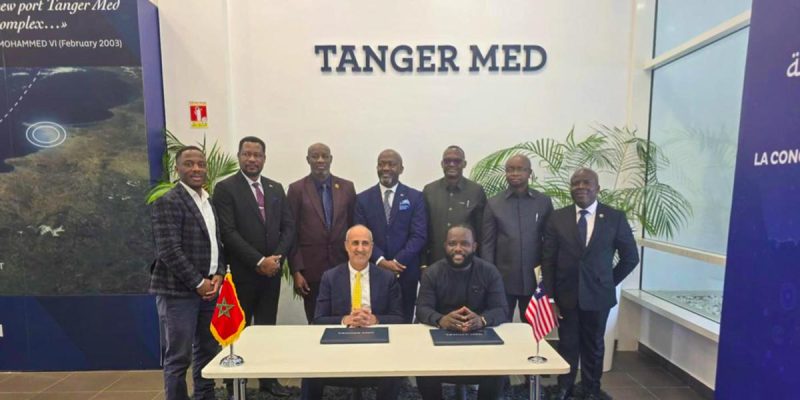Beyond political intentions, Liberia has made a structural shift by sealing a decisive partnership with Tanger Med Engineering. The outcome: a complete overhaul of the port infrastructure in Monrovia and Buchanan, which is a cornerstone of the national agenda for economic revival.
This marks a quiet yet strategic turning point for the Liberian economy. Through the signing of a major agreement with Tanger Med Engineering, the technical subsidiary of the Moroccan port group Tanger Med, Liberia is embarking on a profound transformation of its port infrastructure. The goal is to rehabilitate its two major terminals — Monrovia and Buchanan — to align them with 21st-century logistics and technological standards.
This master plan, the result of several months of shared expertise, aims at much more than just modernization. It embodies the ambition of President Joseph Nyuma Boakai to equip the country with a logistical foundation capable of supporting sustainable, inclusive, and regionally integrated development. It also serves as a concrete example of the « ARREST » vision — an acronym for the presidential agenda focusing on agriculture, roads, reconciliation, education, health, and technology.
With this partnership, Tanger Med confirms its continental leadership in port engineering. The Moroccan group, already involved in several African countries, is contributing its technical expertise to rethink Liberia’s logistical architecture. This is not merely assistance: Tanger Med is committed to the operational implementation of an ambitious program, structured around six major projects: modernization of quays, renovation of container terminals, refurbishment of warehouses, introduction of intelligent logistics platforms, strengthening of port security systems, and the adoption of ecological energy management solutions. Dredging work and expansion of capacity will enable the two ports to handle growing maritime traffic and accommodate larger vessels, repositioning Liberia as a strategic node in the West African corridor.
A National and Regional Impulse
“This agreement goes far beyond an infrastructure project. It is an instrument for economic transformation,” said Sekou Hussein Dukuly, Director General of the National Port Authority (NPA). According to him, this modernization will “create sustainable jobs, attract capital, and strengthen the country’s logistical sovereignty.”
The project includes full digitization of customs and port procedures, improved handling of cargo flows, and a significant reduction in transit times. Such efficiency gains should reposition Liberia as a leading logistics hub for the landlocked countries of the region, starting with Mali and Guinea, while strengthening intra-African trade, which remains underdeveloped.
This new partnership is a continuation of broader cooperation between Rabat and Monrovia. In November 2024, the NPA had already signed a memorandum of understanding with Marsa Maroc for the operation of a multipurpose terminal in Monrovia and the complete rehabilitation of Buchanan port. This first milestone laid the groundwork for a co-development dynamic structured around a public-private model, supported by the sharing of technical and institutional expertise.
The collaboration with Tanger Med Engineering is now the strategic continuation of this effort, consolidating Morocco’s role as a key partner for West African countries seeking to improve their logistics capabilities.
Affirmed Political and Diplomatic Support
The signing of this agreement has been praised by many figures within the Liberian government, reflecting the broad consensus surrounding the project. Senator Momo T. Cyrus, chairman of the national security commission, Congressman Austin B. Taylor in charge of maritime affairs, and Representative Sekou Kanneh have all publicly expressed their support for what they describe as an “economic sovereignty program.”
On the diplomatic front, the joint efforts of Liberia’s ambassador to Morocco, Johnson J. Fayiah, and chargé d’affaires Emmanuel Larmeh were pivotal in extending the presidential vision beyond borders. By facilitating discussions with Moroccan authorities, they contributed to making this agreement an example of active and targeted economic diplomacy.
Beyond Liberia, this agreement is part of a redefinition of trade flows along the Atlantic coast.
Faced with the growing congestion of Nigerian and Ivorian ports, the modernization of secondary hubs like Monrovia and Buchanan could reshape the landscape. Eventually, these two ports could capture a significant share of transshipment traffic and become strategic fallback solutions for major shipping companies.
Source: maroc-diplomatique



